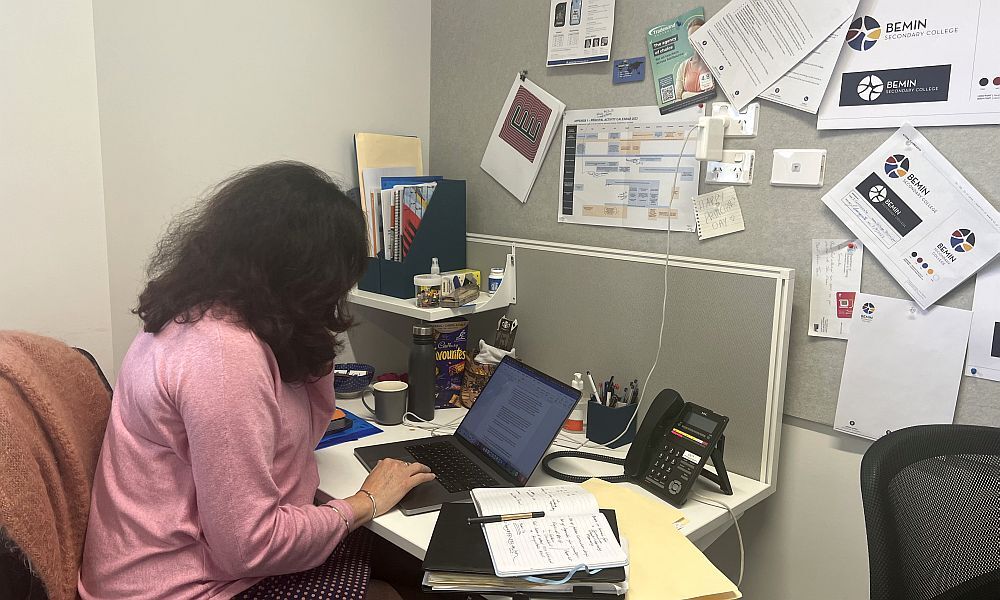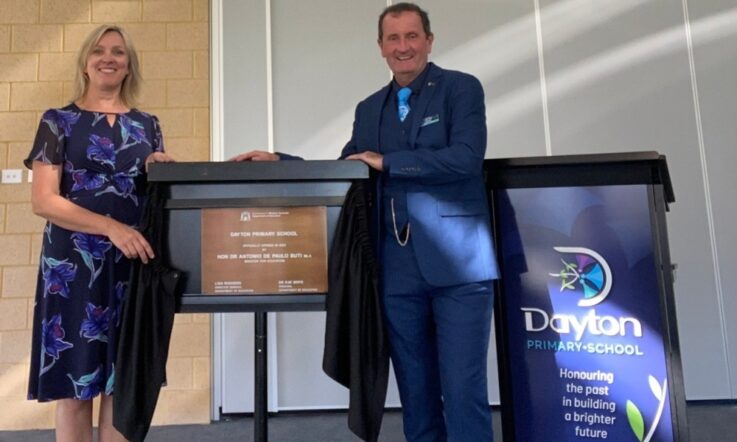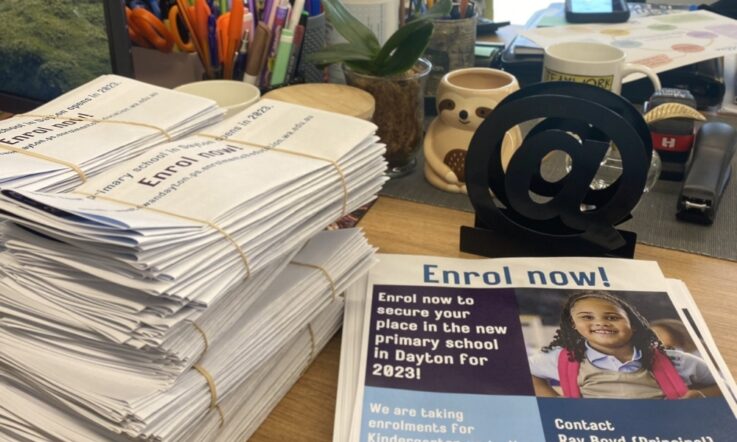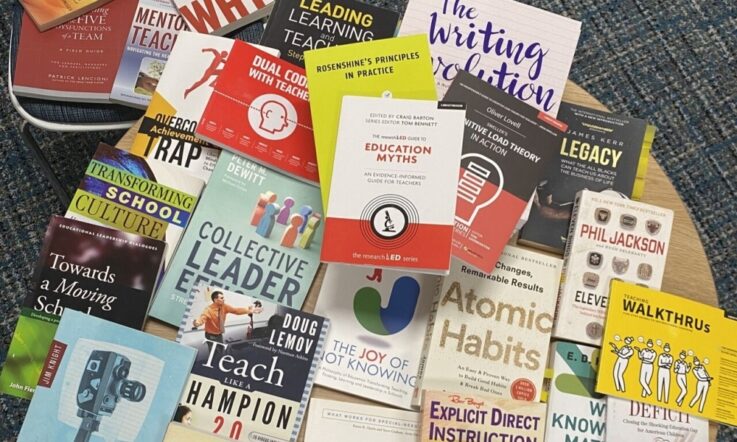This podcast from Teacher is supported by MacKillop Seasons, whose Seasons for Life project supports schools with loss and grief following a suicide and other loss event.
Hello and welcome to Series 2 of the School Assembly podcast from Teacher magazine – I’m Jo Earp. Yes, I’m actually venturing out of the office this year! I’m just about to set off for Truganina, which is just outside Melbourne, to meet with Jo Camozzato for the first time. She’s the principal of Bemin Secondary College, which is a new build school. It’s actually on 2 campuses, which is interesting – they’ve got a year 7-9 campus and a 10-12, so that will be an interesting episode when we find out a little bit more about the different transitions that go along with that structure. But in this first episode, we’ll be chatting about Jo’s experience as an educator, what led her to school leadership and also what’s happened so far in terms of the new secondary school. So, definitely looking forward to this series, like I say we’ll be following Jo and her team right through to June 2024, checking in with them each month.
If you haven’t listened to the School Assembly podcast before, it’s the podcast that explores what it’s like to build a new school from the ground up. So, we’ll be exploring things such as timetabling, long- and short-term planning, school logos and uniforms, obviously the big things like pedagogy and instruction, the vision, the ethos of the school, building on that culture, and then those challenges really as they come along. I should imagine that staffing is going to be something that we talk about a little bit differently this year. We’re in the middle of teacher shortages here in Victoria, as I’m sure most people are across Australia at the moment. So, there’s certainly plenty to talk about. And then, of course, we’ll be touring the learning spaces as well and talking about the actual build. So, yeah, really looking forward to this series – remember to subscribe to the podcast so you don’t miss an episode. Let’s get started.
Jo Earp: We’re here at Garrang Wilam Primary School in Truganina, but actually you’re going to be the foundation Principal of Bemin Secondary School, Jo, so it’s great to meet you. It’s nice to actually come out for School Assembly, which is good, because the first series we did remotely – Ray and Rachael were in WA. So, Jo Camozzato here, we are just starting off on this journey really for us, but for you I should imagine an awful lot has happened. When did the whole process start for you?
Jo Camozzato: Yes, well I applied for the position in Term 1 of this year and I began in earnest in April. So, I’m now, like, nearly 2 terms in, which is a bit scary because the time is starting to really fly by. Whereas in the first term and the second term this year we had a lot of policy writing, and so you can feel a bit like you’re going round in circles, writing policy. But it’s a really rich time, it’s when you’re thinking about your vision, your philosophy, school values, what’s next and you begin the first stage of your recruitment – looking for your Business Manager and Assistant Principal.
JE: And I just met your Business Manager and Assistant Principal, and that’s fantastic that you’ve already recruited them. Was that the plan all along then, that those are the 2 key positions?
JC: Yes. They are the only 2 key positions we’re allowed to have for the rest of this year, so the 3 of us have to work it all out. And, of course, I am excited, but at the same time Bemin Secondary College is a dual campus secondary school. So, it’s the first dual campus school that’s opened in this area for a while. So, basically, I have year 7, 8 and 9 on one campus and 10, 11, 12 on the other campus, and there are still only 3 of us. So, there’s the challenge, because sometimes it actually feels like 2 schools even though we’re the one school. But when I go for site visits I think ‘oh, this looks really good and it’s pretty big’ and then I realise ‘oh, I have another site to go and look at’ and then the reality starts to sink in.
JE: Yeah. So, the unusual thing as well this series is it’s a secondary, so completely different kettle of fish, I think. So, it will be interesting to speak about those particular challenges and differences between primary and secondary. I’m interested then in just the location itself. We’re in Truganina. Just driving around coming to the school to meet you, there’s a lot of building going on – obviously, that’s why they need another school. What kind of area does it serve, then?
JC: Truganina is made up of a lot of new housing estates, probably 10-15 years old, but also things are still opening up and there’s still a lot of families moving into the area; so, there are areas that are still to be developed. The college itself is going to serve a lot of the local primary schools, taking in young people at year 7 (so, that 12-year-old age) but also out in the western region, in this particular pocket of Melbourne, there are a lot of what we call Prep-9 colleges. So, at the end of year 9 they have to go to another school, and so the college is actually here to take in students at year 10 from 3 local Prep-9 schools, where they have very large populations of…2 of them at least have more than 2,000 students. So, obviously I’m not getting 2,000 in one go, but already for next year I have 200 enrolments for year 10 and 100 enrolments for year 7. Very multicultural area, so lots of different families out here from different cultural backgrounds, which makes it quite diverse and quite exciting.
JE: Okay, and so, in terms of the enrolment then, I know that some secondary schools start just as 7 and 8 in the first year, how will it work with yours?
JC: So, this where the challenge is. We start at year 7 and then also at year 10. Year 7 is more about, I suppose, us connecting with our feeder primary schools – one which is Garrang Wilam, where I’m based, which is really nice. So, they have about 50 year 6s here, and a lot of them are going to come on to the new high school. And so even inadvertently I get a chance to meet them by walking around, and then we can develop stronger relationships as the term goes. But the other challenge is the year 9s going into year 10. So, year 10 is traditionally a year where you really start to think about your pathways and what subjects and courses are you going to select that may lead you to a pathway that you want. So, we’re having to think of a way of connecting with our year 9s and start that conversation, so they can select these subjects that we haven’t really created, or written yet, or found teachers to teach, to offer them next year in year 10. So that’s the challenge. So, we have to imagine everything and hope that it’s all going to work out.
JE: That is a challenge, isn’t it. It will be fascinating to talk more with you about that and the transition – you’ve got 2 transitions then, you’ve got, as you said, the primary to year 7 and then year 9 to year 10 as well, and having to get on board with what students are after, and the parent expectations as well. So, that will be interesting. What is your background, yourself. I mean, did you always want to be a principal?
JC: I always get asked that question – I think that’s a really funny question. So, my background is drama and theatre, and I also chose drama and theatre teaching because at the time my family were not very happy that I wanted to go into the performing arts. So, I sort of did a bit of teacher training because I thought that would make them sort of calm down and realise that I could still have a job working in that sort of area. And I did do that for a while. And then I decided that I didn’t want to be a teacher, and that while I taught, I would retrain as a psychologist – so I did actually do that as well with the idea that I would leave education and become a private practising psychologist.
But, what happened was, I promoted – so, I ended up moving into student wellbeing and engagement and then I became a principal class member, involved in wellbeing and engagement. And then I transferred across to teaching and learning, because a very wise principal said to me ‘well, if you can do that with young people, I need you to work with the staff around implementing pedagogical models, building teacher capacity, helping them to come on board during change management’, and I did that. And I kept thinking ‘when am I going to leave and be a psychologist?’. And then, somehow, I became a principal from there, and here I am. And I really do enjoy the challenge of the role, but it wasn’t where I sort of started and where I thought I would be.
You’re listening to a podcast from Teacher magazine, supported by MacKillop Seasons, whose Seasons for Life project supports young people affected by suicide and other loss events throughout Australia. Free for Australian high schools and based on the strong evidence-base of the Seasons for Growth change, loss and grief education programs, the Seasons for Life project builds wellbeing, resilience, social and emotional coping skills, and strengthens supportive relationships.
JE: How long have you been a principal for, then?
JC: This is my sixth year.
JE: And am I right in thinking that this isn’t the first time that you’ve started a school from scratch?
JC: You’re absolutely right. So, I had the privilege of starting another new school in the northern suburbs of Melbourne called Edgars Creek Secondary College. And we opened, just with year 7s, so the challenge is different. We opened offsite with only 2 of our major buildings being ready in our first year in the middle of the year, and then we moved onsite. And that was a very creative time because you really have to think outside the box. New schools are fantastic, but depending on the staged build you don’t necessarily get all your facilities in one go. And so, you do sometimes have to sort of be flexible about where you are going to have art until the art room and the art space is ready. This school is, you know, a little bit further advanced. So, Bemin Secondary is going to have a lot more facilities ready on the day, which is a lot more helpful for actually planning curriculum.
JE: And we can hear the sounds of school going on around us, which again is fantastic – normally I’m confined to the office, so that’s good. So, your expectations of what the process will be like I guess are slightly different having been through it once before?
JC: Yeah, it’s different but I’m kind of really resolved to staying open and responsive to what goes on around me. Things have changed in 6 years, and I think people forget how quickly things do change. But all you need to do is reflect back on the pandemic and how that brought a lot of things to fruition and there was a high intake in use of technology that hadn’t been used before…you know, when I opened Edgars Creek we made sure we had eBooks and used an online platform, but many schools were still getting students to carry around hard textbooks as the only alternative, well now most people have eBooks and you can buy the hard cover textbook if you wish.
So, things have really shifted, and I think it’s important to … even though some things I’m familiar with, I know to stay calm about the build, that will happen – they are great people that build schools, I don’t get too worried about that, but if a curveball comes my way you’ll go ‘okay’. Because really, people generally want the best for students and young people and children, so they’ll work really hard with the principal to try to make sure there’s a smooth transition for the school to open.
JE: Is there a key thing that needs to be in place, do you think? I mean, is there a priority for you, or is that even not possible? Like, for you, is it the staff? Or is it going to be the build…like you say, you’re quite relaxed about the building. What is it you’re most concerned about? I don’t want to put concerns there that aren’t there.
JC: What keeps me awake at night, we often say.
JE: Yeah, what keeps you awake at night?
JC: Look, what keeps me awake at night really is making sure that I can find good quality staff for the foundation year to set up good groundwork for curriculum development and forward planning. And also, you want staff that the students can connect with, people that have got excellent relationship building skills, that are open-minded, that are flexible, that have a sense of humour. And like a lot of places around Australia we’re all a bit concerned about the teacher shortage, without getting bogged down that line because you do also have to stay positive in order to have a problem-solving mindset. But, yeah, that wasn’t an issue that I faced the first time around; there were plenty of people to choose from, not the same anymore.
JE: And so, is the plan then … we’ll talk about timetabling actually next month, about the planning side of things and how you prioritise, how you keep track of this enormous amount of things that need to be done, big and small. But is the timetabling then to open beginning of next year? When are you hoping to have the buildings done?
JC: That’s another really good question! So, the predicted date of the school being finished is the 20th of December, this year.
JE: Okay. Okay.
JC: And I’m pretty confident (well, maybe I shouldn’t say that), that hopefully most of that will happen by then; they might still be doing a bit of gluing and tacking in January. But, yeah, we’re supposed to open day one, term 1, and I know that they’ll make that happen.
JE: And in the meantime, you’re here. It must be nice to be actually in a school environment, and like you say, you’re here with some of the kids who are going to be coming to you.
JC: Yeah, I have to say it’s a really lovely school, the kids are really friendly, the staff are really friendly and also, I suppose it’s a way of connecting with the community – it’s like a friend is introducing you to the community, and that’s really helpful too. So, you know, I’ve had to put together an interim School Council, and the principal of this school has sort of suggested some parents, but so has the principal of another nearby school. And they sort of say, you know ‘have a chat to these parents, see what you think’. So, it is really lovely to be here, you don’t feel lonely. And also, people are curious – so even though there’s a lot of teachers here and they’re really happy here (so I’m not trying to poach anyone), they want to know what you’re doing ‘oh, is that you’re uniform?’, ‘I saw your logo the other day’, ‘how are you going with your interviews?’. So, it’s nice to be able to share that excitement with people rather than being home alone, and just working your laptop.
JE: Well, we are very much at Teacher looking forward to following you for the next year or so, it will be. One thing we always ask at the end of the episodes is 3 key questions. So, proudest achievement, biggest hurdle and key learning? So, this might be small, it could be large. So, we’ll start with proudest achievement so far.
JC: I think the proudest achievement was that 3 weeks ago we had what I call an informal meet and greet opportunity for the families, and we really had limited ways to advertise that. We just sort of sent out, you know, a digital flyer if you like to the local schools, to the local community centre, we didn’t even have our school Facebook page at that point. And we were really hopeful that some families would pop into the local community centre to just meet us to let us know what part of the world their family originated from, to give us their view on the uniform pieces we had on display, and it was really great. It was well over 100 families came in, over a period of 3 or 4 hours – so they could come when it suited them, before or after dinner – and that made me feel really excited. And I thought ‘wow this actually worked with limited publicity’, that there is a word of mouth and people are curious and interested. So that would probably be the proudest thing.
Hurdle? I don’t know. I don’t even know if I have a hurdle right now. A hurdle is more about just problem-solving, putting in place some preventative measures and really starting to think how am I going to staff the school, and what ways, how can I think outside the box? So, I think ‘hurdle’ is too strong a word, because I haven’t really felt that, yet so maybe ask me next time. And what was the last one?
JE: Key learning, over the last few months.
JC: Well, I suppose it’s a key learning but it’s also a remembering. You see, no school is the same. It’s like a production, no drama production is the same, you don’t repeat the same thing. So, this is a different play, a different story, a different narrative and you know it’s good to learn and remember that. And so, you need to respond to the community that you’re serving and understand … and the time, like I said 6 years has gone by since I last opened a school. And even when I think about the uniform, this time around I went ‘no, I don’t want certain pieces of uniform, I think things have changed and it’s really important that young people can choose from a wardrobe of items’ – do you like that? A ‘wardrobe’ of items! And families have said to me ‘oh, thank goodness’ because they’ve been battling young people every morning saying ‘you’ve got to put your winter uniform on’, ‘you’ve got to put your summer uniform on’. Whereas I think primary schools moved quicker into that space, where there was a collection of clothing. But secondaries tend to still have, can have (I think more secondaries are moving this way), but can have very linear – like, this is summer, this is winter … and I’ve just gone ‘this is it, and you can choose to wear whatever piece you want’.
JE: Very good. As you say, all stories are different, all narratives are different. We are very much looking forward to following your story and we’ll catch up next month when we’ll be talking about timetabling and planning. But in the meantime, it’s been great to meet you, Jo.
JC: It’s been wonderful, thanks Jo.
That’s all for this episode, thanks for listening. I’m on my way back to Melbourne now after a great chat with Jo, a great first meeting. Looking forward to catching up with her again next month. If you want to keep listening now, then you can access more than 180 podcasts in our archive – you just head to teachermagazine.com to access those, or wherever you get your podcasts from. If you could do me a massive favour as well, if you could leave a review on the podcast channel that would be awesome – it helps people like you to find the podcast and it’s also a great support for the team, so thank you for that.
You’ve been listening to a podcast from Teacher, supported by MacKillop Seasons, Seasons for Life – supporting schools and young people affected by suicide and other significant losses. Visit mackillopseasons.org.au.



